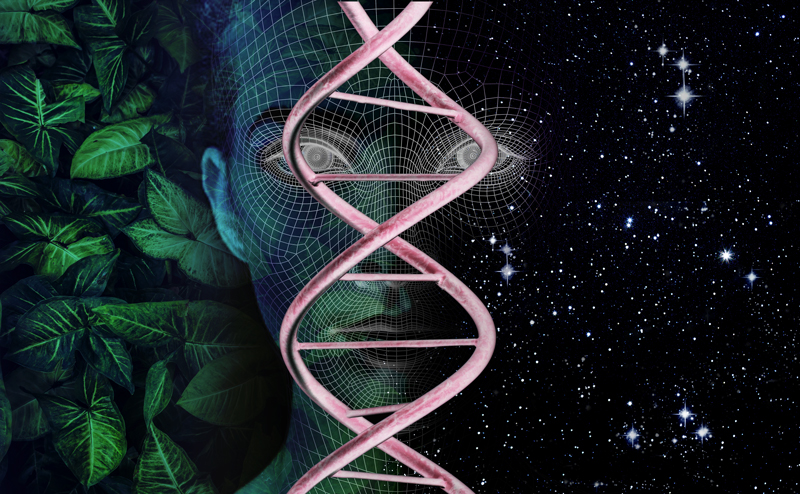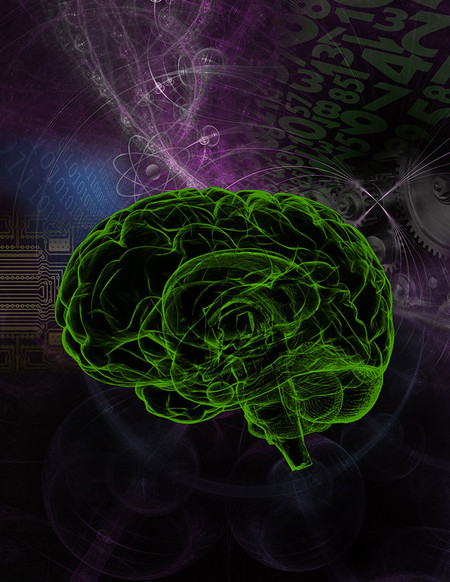The first evidence of art has been found in seaside caves in southern Africa. Paleo-anthropologists have uncovered artifacts with geometric designs, as well as ochre for skin pigmentation, dating back to about 100,000 years ago.
Somewhere around that time a cognitive leap in human evolution took place. From that point on, anthropologists refer to these people and their descendents (us) as “fully modern humans.” In short, we become “symbolic creatures.”
I maintain that we have reached the end of our reign as symbolic creatures on earth, and that the viability and diversity of the earth, and our prosperity on it, don’t lie in replicating ‘higher thought’ through artificial intelligence, but in the awakening our latent capacity insight in the human brain. Our brains are exapted for insight.
Exaptation is defined as “the utilization of a structure or feature for a function other than that for which it was developed through natural selection.” The oft-cited example is when dinosaurs evolved feathers for warmth, which were later ‘exapted’ for flight in the descendents of dinosaurs, which we observe among us every day—birds.

For hundreds of thousands of years technology and culture, as well as linguistic and conceptual capabilities, changed very little. Sure, there was the ‘domestication’ fire about a million years ago (a term that carries a bitter tinge and singe here in northern California of late). The use of fire had huge implications for the growth of the brain, since cooking flesh enables the absorption of many more calories than eating it raw.
If they still existed, we would view the various species of sub-humans that inhabited Africa, Asia and Europe before ‘fully modern humans’ emerged as developmentally disabled. We might recognize them as people perhaps (though chimps are people too), but they would be cognitively incapable of learning beyond the level of a child.
Though human intellectual capability varies widely from individual to individual, it has nothing to do with race, and a great deal to do with nutrition, environment and education.
I’m not exploring human cognitive capabilities however, but the latent capacity for a deeper intelligence that the evolution of the human brain has given us.
At a time when man’s machines are on the verge of being imbued with selfhood, there’s real urgency to gain widespread insight into an old philosophical question: What’s the next step in human evolution?
It clearly doesn’t have anything to do with Artificial Intelligence, the projected holy grail of god-like humans.
AI represents a great threat to the development of the latent capacity for insight in the human brain. Why? Because as it’s presently conceived, AI’s recapitulation of thought, with far greater memory, speed and processing capability—is a tremendous impediment to the very thing that needs to be transcended—psychological thought.
Let’s say that in the next 20, 50 or 100 years scientific and tech geniuses are able to construct a computer that can not only think, but also think that it is a thinking thing. In other words, “I think, and therefore I am.”
As wrongheaded as Descartes was with his cornerstone of the self and modern Western philosophy, most scientists and philosophers still buy into it at some level, and therefore would call such a computer ‘sentient.’
That’s inane to the point of insane. Like “Hal” in “2001, A Space Odyssey,” all it proves is that the self is a program, one that can be imbued with emotions, including the fear of death.
Of course emotions are embedded in the program in these silly conceptions and constructions of sentience, whereas in humans, programs (also known as conditioning) are permeated with emotions. Neither is a mark of intelligence, but unintelligence.
Intelligence is the capacity for insight and understanding, which is always of the present. No computer can or will ever have an insight, or do anything but mimic understanding and compassion.
Insight can and does inform thought, but insight comes from a completely different source than thought, both in and beyond the brain.
The externalization, as AI, of the evolutionary gift/curse of symbolic thought has become one of the main drivers of both our demise as a species, and potentially, the liberation of our latent capacity for insight. AI will to dumb us down to sub-humans levels, or we will discover and liberate a completely distinct capacity than thought within ourselves.

So the human brain is exapted for insight, but it’s up to each person to consciously awaken its capacity to the fullest possible degree within her or himself.
Smarts and intelligence are two completely different things. No matter how smart AI becomes, we can, if we deeply understand and live the difference between artificially sentient machines and authentically sapient human beings, think philosophically, teach our children to be attentive and self-knowing, design beautiful bridges and buildings, and tend our gardens and manage our factories.
There’s no such thing as a computer that isn’t based on memory and programs. However a person that no longer bases his or her life on memory and programs is a growing human being.
Martin LeFevre

